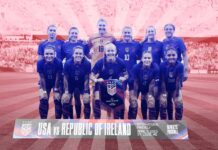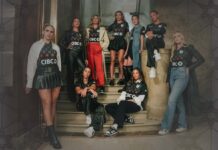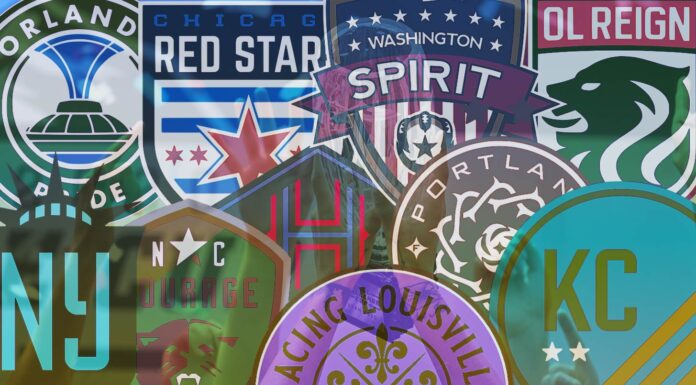The NWSL and NWSLPA revealed that they came to terms on a collective bargaining agreement in a historic announcement earlier this week. But in order to appreciate the major step forward and understand how the new NWSL CBA will create a more positive environment for players, we must look back at the turmoil the league has faced throughout its history.
On the evening of January 31, the National Women’s Soccer League and the NWSL Players Association struck a deal on their first-ever collective bargaining agreement. The deal, which runs through 2026, boosts player salaries (with annual increases), provides the players with the means to change teams via free agency, and improves health benefits.
The deal raises the league’s minimum salary by 60% to $35,000, up from 2021’s minimum of $22,000, which required many players to work additional jobs just to make ends meet, and gave rise to the #NoMoreSideHustles campaign. Salaries will rise annually by 4%, and players will receive more free housing, transportation, 401(k) matching contributions, health insurance, and other benefits, including up to six months of paid mental health leave, 42 days of vacation, a seven-day summer break during the regular season, and, for parents, eight weeks of leave for birth or adoption, plus access to nursing facilities. According to the league, the average total compensation per player will rise by more than 30% from 2021, to about $54,000.
Also, starting in 2023, the league will offer free agency for players who are out of contract and have six or more years of experience in the league. That threshold for full free agency falls to five years starting in 2024, with players who have at least three years of service time eligible for restricted free agency. Additionally, players who are waived by teams will receive four weeks of severance pay, a month of housing, as well as a month of health insurance.
The NWSL will also pay up to $300,000 per year for group license image rights and, if the league is profitable for the third, fourth and fifth years of the CBA, players will be able to access revenue sharing, including 10% of net broadcast revenues. In all, the league says that it has committed to $100 million of incremental investment over the life of the CBA.
“This transformative agreement represents deserved advancements for our players, including significantly stronger compensation packages and benefits, enhanced training and playing environments, and a long-term commitment to continually improve the standards we all regard as essential,” said NWSL interim CEO Maria Messing in a statement released after the agreement was reached.
The added financial and non-financial compensation making its way to the players were, of course, immensely significant in getting this deal over the line. In the NWSL’s case in particular, non-trivial issues such as travel conditions and health care certainly needed addressing. However, every bit as significant are a few words in an NWSLPA statement that go a long way toward providing the backstory of Messing’s “interim” tag:
“Players will report to preseason camp tomorrow (February 1) with the safety, security, and protections of a collectively bargained contract that sets the NWSL on a positive trajectory.”
Key words here are safety, security, and protections.
Protect the players. Protect women. It’s everyone’s responsibility to hold the standards and enforce accountability. Why are we still dealing with these mostly male transgressions? This is unacceptable. @NWSL
— Christine Sinclair (@sincy12) September 30, 2021
In March 2021 (as later reported by The Athletic), some 240 players — organized by Orlando Pride and USWNT star Alex Morgan — sent then-NWSL Commissioner Lisa Baird a letter demanding nine elements “to ensure safe and inclusive workplaces, including multiple avenues to submit complaints, and assurances that the league would protect any player from retaliation.” In response, the league established a new anti-harassment policy.
This was undoubtedly a step in the right direction, and the past year has brought an unprecedented level of action on this front. Five head coaches (all male) of the league’s 10 teams resigned or were fired due to allegations of misconduct.
That is what lay at the core of the CBA negotiations: The players’ need for protection from not just mistreatment and abuse, but also the willful ignorance by those in power. To blindly celebrate would be to absolve the league and its teams of their longtime complicity in the mistreatment of players.
NWSL history — basically, all of it — is teeming with scandals involving verbal abuse and sexual misconduct toward players by authority figures, and a lack of willingness by others in power to address those issues. For the uninitiated, it’s a veritable horror show.
In July 2021, Farid Benstiti resigned his role as head coach of OL Reign. At the time, he was feted by team executives, who, while framing the departure as results-driven, expressed “appreciation for Benstiti’s many contributions over the past 18 months,” “great respect for Farid’s talents and all he brought to the organization,” and wished him well in all future endeavors.
In October, The Washington Post reported that, at the time of his resignation, Benstiti was the subject of a formal complaint by a player for verbal abuse. It’s worth noting that months earlier, in March 2021, USWNT and current Portland Thorns player Lindsey Horan detailed, on a podcast hosted by fellow NWSL player Cari Roccaro, that in her time under Benstiti at Paris Saint-Germain, he and his coaching staff made a habit of shaming players for their weight.
OL Reign CEO Bill Predmore, who publicly praised Benstiti’s contributions to the club in early July, said that the team had instituted a “zero-tolerance policy” with Benstiti. According to Predmore, after Horan’s comments, the team investigated the allegation of inappropriate comments to an OL Reign player, and requested Benstiti’s resignation. It was later revealed that Predmore didn’t disclose the true reason for Benstiti’s dismissal in order to minimize damage.
We Deserve Better (Part II) pic.twitter.com/c1MIAnrOde
— Meghan Klingenberg (@meghankling) September 30, 2021
In July, Gotham FC fired general manager Alyse LaHue, “based on the results of a league investigation into a complaint of violation of league policy,” reportedly related to an unspecified violation of the league’s anti-harassment policy. On August 31, Racing Louisville FC, playing its first NWSL season, announced the termination of head coach Christy Holly‘s contract “for cause.” Details surrounding his firing were also not disclosed.
Then there’s the case of Richie Burke, then-coach of the now-champion Washington Spirit. Burke was fired in September 2021 for verbally abusing players and making racist and anti-gay remarks. Lest one be tempted into thinking that this was a one-time occurrence for Burke, at the time of his hiring in 2018, former players, and the families of former youth players spoke out about his abuse, and Spirit players raised concerns about a year into his tenure in D.C.
However, Burke remained the head coach until August 2021, when he was moved to the front office due to “health concerns” supposedly brought about by the rigors of coaching. No mention was made at the time of members of his team quitting as a result of abuse. Only in the aftermath of a Washington Post story chronicling his behavior, and NWSL intervention in light of its new anti-harassment policy, was he finally fired. In his wake, then-Spirit CEO and co-owner Steve Baldwin resigned, “at recent request of the players.”
In November, Baldwin announced his intent to sell his stake in the team, via exclusive sale negotiations with The St. James, a D.C.-area sports/performance center. However, fellow co-owner Y. Michele Kang has since acquired much of the team’s outstanding debt and upped her ownership stake to 52%, at a reported $35 million enterprise value (equity plus debt), well above the best bid from the St. James. The team’s other investors have long since preferred Kang’s bid, though Baldwin has equated her submitting a superior offer with a coup.
And then there’s the disgrace that is Paul Riley, and the shadow of his grotesque behavior, which hangs over the Portland Thorns and North Carolina Courage.
Last September, former players Mana Shim and Sinead Farrelly, in a phenomenally well-reported and thorough article at The Athletic, made public allegations of sexual abuse and coercion against Riley, who coached the Thorns in 2014 and 2015. During his time in Portland, Riley abused his power as coach in order to coerce Farrelly into sex with him, and attempted to do the same to Shim. In response, Shim filed a formal complaint in 2015 detailing Riley’s conduct to Thorns’ leadership. The team took no action and simply allowed Riley to run out his contract. At the time, Thorns owner and CEO Merritt Paulson said that the coverup of Riley’s behavior had been prompted by a “respect for player privacy” — though apparently no players’ opinions on the proper course of action were sought.
Also at this time, then-commissioner Baird claimed via email that she was “shocked” and “disgusted” by these “new allegations,” and that the league and North Carolina Courage had “reacted swiftly” in distancing themselves from Riley. She added that the matter had been “investigated to conclusion,” vaguely promised increased future vigilance, and provided nothing more of substance.
(3/3) pic.twitter.com/BkGlHsPiV4
— Alex Morgan (@alexmorgan13) September 30, 2021
While Baird was certainly right to be “disgusted” by the allegations, the “shock” ought to have come months earlier in late April, when Baird had been informed via an email from Farrelly that Riley had not been fully investigated in 2015. Rather, at the time Baird responded by simply stating that there would be no further investigation. The damning email thread was shared with the public via Twitter by ex-Portland Thorn player Alex Morgan on September 30. That same day, Baird, exhibiting some jump-before-you’re-pushed savvy, resigned as commissioner. She was accompanied through the exit by Lisa Levine, the league’s general counsel.
After his departure from Portland in 2015, Riley was hired by the Western New York Flash (now the North Carolina Courage), who were “aware of a complaint filed against Riley,” but confident that it “showed no unlawful activity,” and stated that they’d been “assured that he was in good standing.” It’s worth noting here that the man who hired Riley to coach in New York, Aaran Lines, who married one of his own players while he was coaching the Flash, could probably have done some solid data-gathering, as he and Gavin Wilkinson — the Thorns’ general manager since the team’s inception — are more than acquaintances, having played together on both the New Zealand national team and in MSL with the Portland Timbers.
Alas, Riley remained the coach in North Carolina, and received praise from Paulson through since-deleted social media posts — until September 30, 2021, some six years after Shim’s formal complaint. At that time, after Thorns players collectively released a statement demanding that Wilkinson be placed on administrative leave pending an investigation, the Thorns finally promised via open letter from Paulson a “comprehensive and deliberate independent investigation” into the original handling of the matter. As of late January, the team had announced the closure of the internal investigation, with no additional formal comment, and had named former player Karina LeBlanc as GM, while seemingly promoting Wilkinson to President of Soccer, overseeing both the Thorns and the Timbers.
Finally (idealistically, but for now at least), there is the case of Rory Dames. On November 20, 2021, the Washington Spirit, led by interim coach Kris Ward, defeated the Chicago Red Stars, coached by Dames, 2-1 in extra time to win the 2021 NWSL Championship. Dames was the league’s longest tenured head coach at the time, as he held the position in Chicago since 2011.
A little over a day after the championship game, in the middle of the night, the team announced that Dames had quit in order to spend more time with his family and focus on his next endeavors. About 15 hours later, The Washington Post quoted several Red Stars players, including Christen Press, Jen Hoy, and Sam Johnson, who alleged verbal and emotional abuse against Dames.
Press, who played for Dames from 2014 until 2017, said she first complained about the coach in 2014, to then-U.S. Soccer president Sunil Gulati. In 2017 she asked to be traded, and later filed a formal complaint with U.S. Soccer, which prompted an investigation, after which “the federation took no apparent action, and it continued to pay national team players to play for Dames with the Red Stars.” Press says players heard nothing more on the subject from the federation.
The initial behaviour, the actual abuse & intended harm is bad enough. It’s disgusting.
For those who sat back, covered it up.. protected the abuser & not those abused.. you are evil.
My heart hurts for all those abused. Your bravery is for all those to see.
it’s stops now.
— Jessica Fishlock MBE (@JessFishlock) September 30, 2021
On February 1, as initially scheduled, the majority of NWSL players (some remain on loan or international duty) reunited with their teammates while reporting to preseason training camp. Thus, the NWSL will kick off its 10th season on March 19, with a third installment of the Challenge Cup, and then kick off the regular season on May 15. That an agreement was reached in time to avoid the loss of meaningful action is certainly wonderful news.
However, for those seeking a real cause for celebration, look at the NWSL Players Association. After what has to have felt like an eternity of being failed, repeatedly and systematically, by the individuals and institutions whose sole purpose is to provide a safe and suitable environment in which to train and play, these players, through a union that only came into formal existence in April 2021, rightfully demanded that blind gratitude for merely having a professional league in which to play — substandard pay, shamelessly hostile and abusive working conditions, disregard for player safety, and inadequate facilities — is not how it is going to go down anymore.








